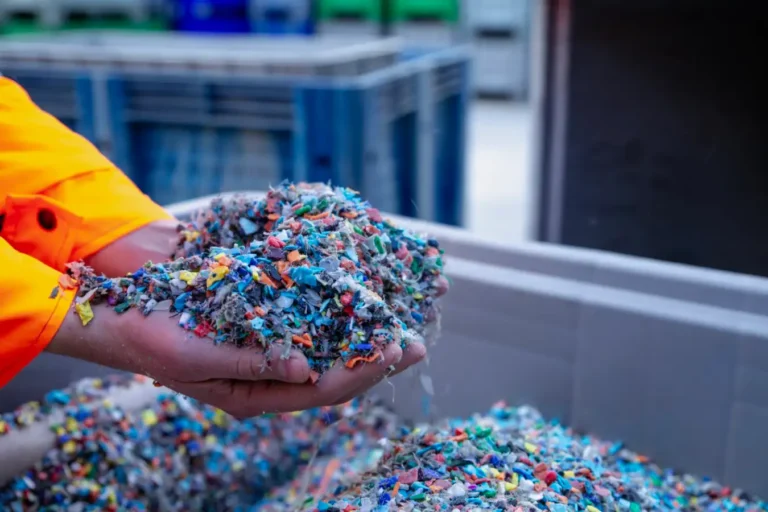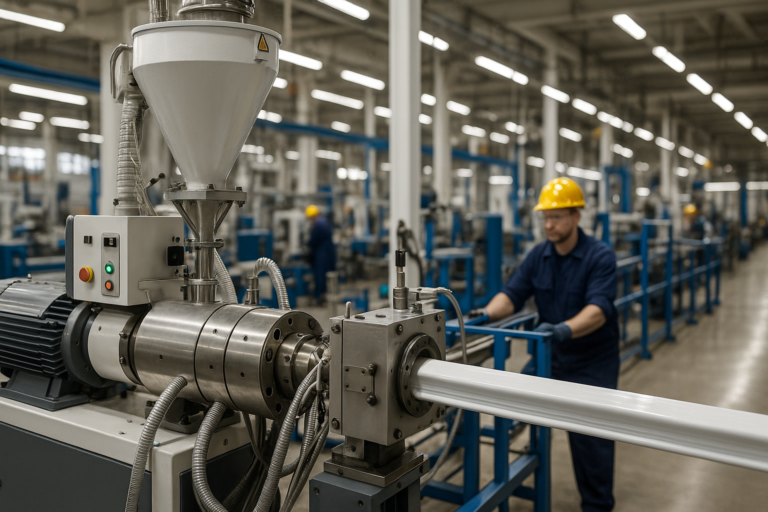Make some changes to the world environment
-
Building 3, Wanyang Innovation City, Langxia Street, Yuyao City, Zhejiang Province
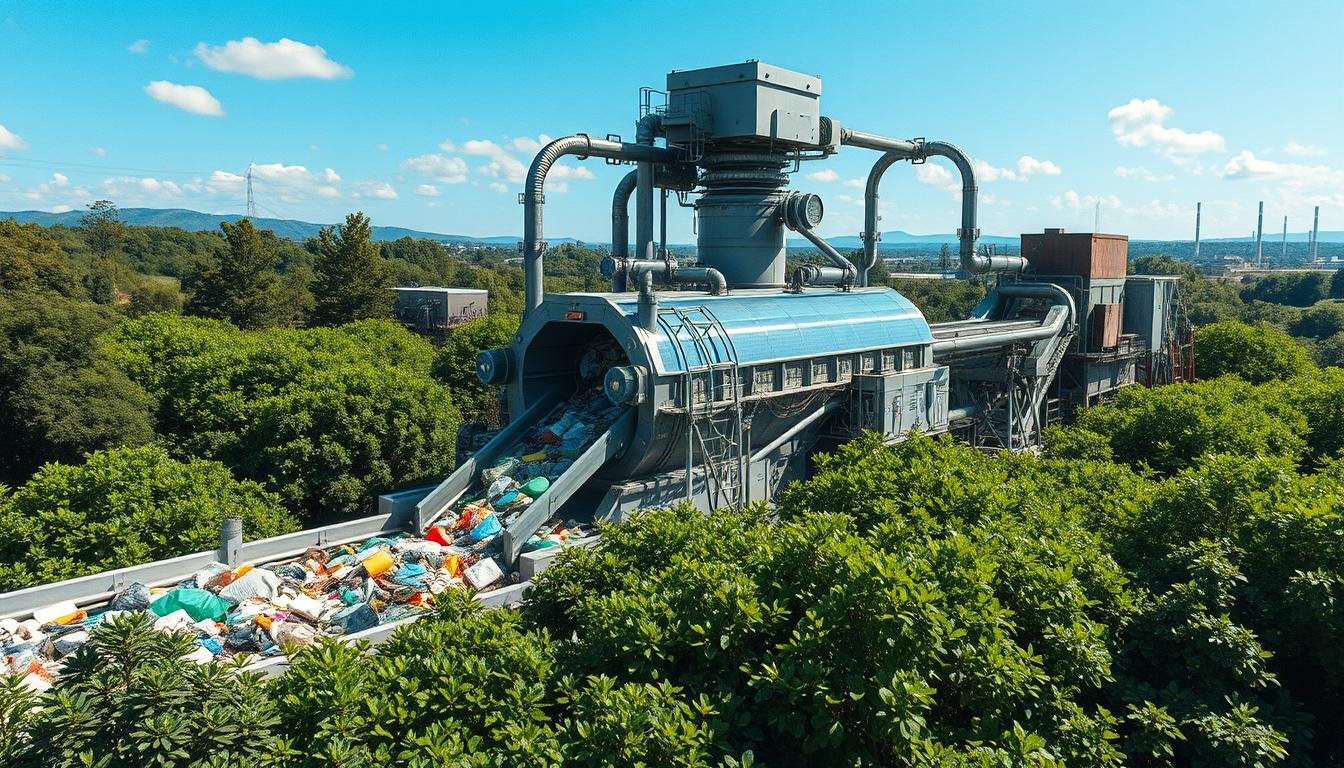
Omori Recycling Machine: Industrial Waste Solutions
How can the Omori Recycling Machine revolutionize industrial waste management and drive sustainability in an era of increasing environmental concerns?
The Omori Recycling Machine stands as a pivotal solution in industrial waste management solutions, offering advanced technology tailored to streamline recycling technology. Renowned for its efficiency, this innovative machine helps industries across various sectors enhance their environmental footprint by effectively managing waste products. With growing global attention on sustainability in waste management, the Omori Recycling Machine emerges as a game-changer for industries seeking eco-friendly waste processing solutions.
Key Takeaways
- The Omori Recycling Machine plays a critical role in modern industrial waste management solutions.
- Advanced recycling technology ensures efficient waste processing.
- Focus on sustainability in waste management aligns with global environmental goals.
- Industries can significantly improve their environmental footprint with this machine.
- Proven track record of enhancing waste management across various sectors.
Introduction to the Omori Recycling Machine
The Omori Recycling Machine is a groundbreaking tool designed to optimize waste management in various industrial sectors. By integrating sophisticated recycling innovation, the machine significantly minimizes waste volume while increasing recycling rates. It offers unique solutions, ranging from the recycling of cans, glass bottles, cardboard, dead batteries, and computer parts, each yielding tangible rewards in the form of clams4.
Industrially, utilizing this machine ensures the adoption of sustainable industry practices. One of its standout features is its reward system, where users can earn Seer Goggles, Flashlights, Cellphones, and Universal Remotes based on the number of items recycled5. This incentivization underlines the technological prowess of the machine in promoting waste reduction technology.
Moreover, the Omori Recycling Machine is not just a facilitator of sustainable industry practices; it also plays a crucial role in educational and environmental achievement. For instance, after depositing specific amounts of items, users can unlock unique achievements such as the “Recycling is a Concept” badge, reinforcing the cultural importance of recycling in a fun and engaging way6.
Overall, the Omori Recycling Machine is a stellar example of recycling innovation. It embodies sustainable industry practices by offering a gamified, yet effective approach to waste reduction technology, making it a paradigm of modern waste management solutions.
Industries Benefiting from the Omori Recycling Machine
The Omori Recycling Machine has revolutionized multiple sectors with its innovative technology and sustainable approach. Below, we explore its impact on meat and deli packaging, as well as dairy and cheese packaging.
Meat and Deli Packaging
In the realm of meat packaging solutions, the Omori Recycling Machine has been a game-changer. Companies utilizing this technology have reported significant reductions in plastic waste, aligning perfectly with growing global sustainability goals. For instance, the machine’s efficiency has enabled swift transitions to resealable flow-wrapped packaging, a feature that enhances both functionality and environmental benefits. Notably, the Criterion series of cartoners from RA Jones, a Coesia company, integrates advanced position indicators, ensuring precision and reliability during size changeovers7. This enhanced precision is crucial for maintaining the quality and safety of meat products throughout the packaging process.
Dairy and Cheese Packaging
The dairy industry, too, has made significant strides owing to advancements in dairy packaging technology introduced by the Omori machine. Dairy and cheese packaging have evolved with a strong focus on reducing the use of non-recyclable materials. The transition to innovative packaging techniques such as resealable and multi-layered packaging has been noteworthy. Primary and secondary containers, akin to those in pharmaceutical packaging, ensure both the safety and quality of dairy products8. By employing these advanced materials and techniques, the dairy sector fortifies its commitment to sustainable packaging approaches, bolstering its market presence and adhering to stringent regulatory standards.
Technological Advancements and Features
The Omori Recycling Machine is at the forefront of innovative recycling technology, offering advanced waste management systems designed to enhance efficiency in recycling. Among its key features is the SeloPack™ packaging concept, which ensures stable sealing and gas-tight packaging even at high speeds. This technology is crucial for reducing food waste and extending the shelf life of products, thus promoting sustainable practices.
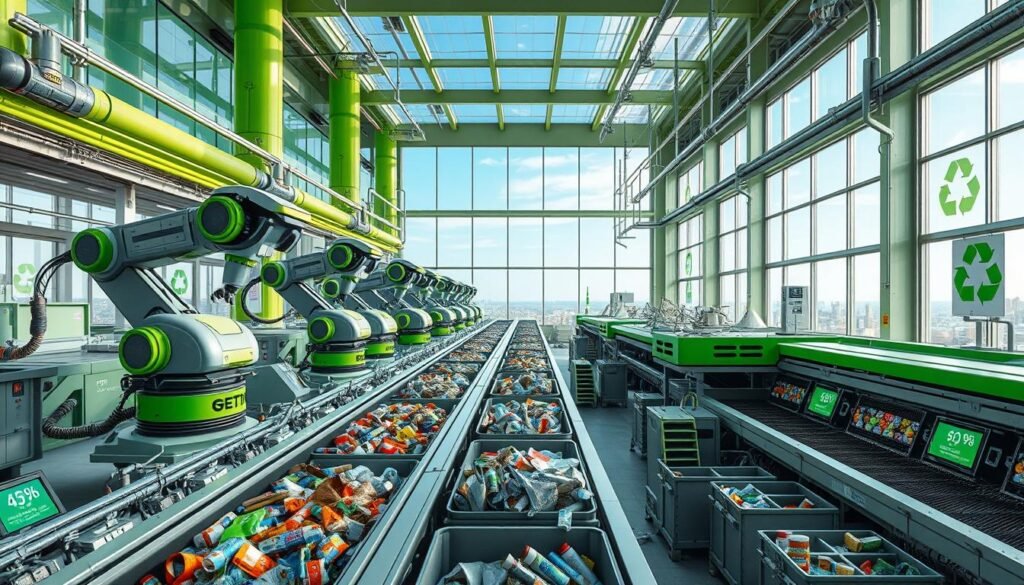
The company’s emphasis on advanced waste management systems is evident through the continuous improvement of their machinery. For instance, Perfect Automation has successfully conducted trials with existing customers to eliminate PVC film from mushroom packaging processes, replacing it with Japanese polyolefin film, aligning with APCO standards9. This improvement highlights the machine’s flexibility in accommodating different materials while maintaining high performance.
Additionally, the market for continuous cartoning machines, which overlaps with technologies used in recycling, is projected to expand at a Compound Annual Growth Rate (CAGR) of 8% during the forecast period from 2024 to 203110. Major companies in this market, such as IWK and IMA, are focusing on integrating automation and Industry 4.0 features to enhance production speed and reduce downtime10. This integration is a testament to the industry’s commitment to efficiency in recycling.
The transition from classic thermoforming packs to new resealable flow packs by Don Smallgoods illustrates another significant advancement, resulting in a 50% reduction in plastic use and contributing appreciably to sustainability9. Such technological advancements in the Omori Recycling Machine demonstrate how the adaptation of modern solutions can directly lead to reduced environmental impact, aligning with global sustainability goals.
Below is a detailed comparison of sales revenue highlights for major market companies involved in these technological advancements:
| Company | Sales Revenue |
|---|---|
| IWK | $100 million |
| IMA | $1.5 billion |
| Syntegon | $1 billion |
| Rovema GmbH | $150 million |
Environmental Impact and Sustainability Goals
The Omori Recycling Machine is at the forefront of driving environmental sustainability in industrial settings. This innovative machine plays a pivotal role in minimizing plastic waste and promoting a circular economy in recycling. By integrating advanced technologies, the machine enhances our efforts to reduce the environmental burden of our business operations, aligning with global sustainability goals.
Plastic Reduction
Plastic waste reduction is a critical objective for companies endeavoring to enhance their sustainability. The use of the Omori Recycling Machine aids in significant plastic reduction, as it efficiently processes and repurposes plastic materials. This ability is essential in supporting environmental sustainability and provides substantial assistance towards achieving the industry’s sustainability goals. The ongoing commitment to reduce plastic waste through advanced recycling techniques demonstrates a proactive approach towards minimizing environmental impacts and enhancing the efficiency of raw material usage.
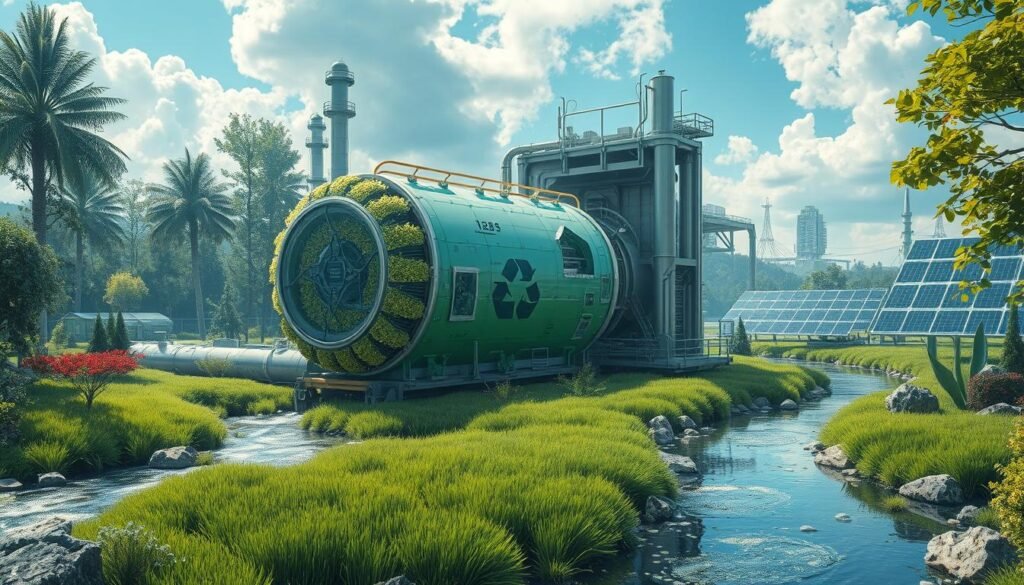
Recycling and Circular Economy
Recycling and fostering a circular economy in recycling are fundamental aspects of modern environmental strategies. The Omori Recycling Machine supports these endeavors by facilitating the continuous reuse of packaging materials. This approach conserves resources and promotes a more sustainable production cycle. Initiatives like these help industries transition to decarbonized clean energy in their production and business activities, contributing to a carbon-neutral society by potentially reducing greenhouse gas emissions11. Moreover, in a more optimistic 1.5˚C scenario, tightening regulations on GHG emissions will drive further advancements in recycling technologies, fostering a thriving circular economy11.
| Company | Approach | Impact |
|---|---|---|
| Isuzu Group | Transition to decarbonized clean energy | Reduction of environmental burden11 |
| Daiseki Group | Recycling of industrial waste | Enhanced environmental protection3 |
| Omori Recycling | Advanced plastic reduction techniques | Increased sustainability |
In essence, the Omori Recycling Machine is a catalyst for progress in environmental sustainability, plastic waste reduction, and the circular economy in recycling. By adopting such technologies, we pave the way towards a more prosperous and sustainable future.
Challenges in Industrial Waste Management
Managing industrial waste presents significant challenges, particularly for industries seeking to implement sustainable waste solutions amidst rigorous environmental regulations and the need for continuous innovation. One primary challenge involves the consistent development and integration of new technologies to address evolving waste management issues. For instance, industries must keep up with the advancements in recycling machinery for various commodities such as wire of iron, non-alloy steel, and machinery related to the industrial preparation of meat and poultry, identified by specific commodity codes12.
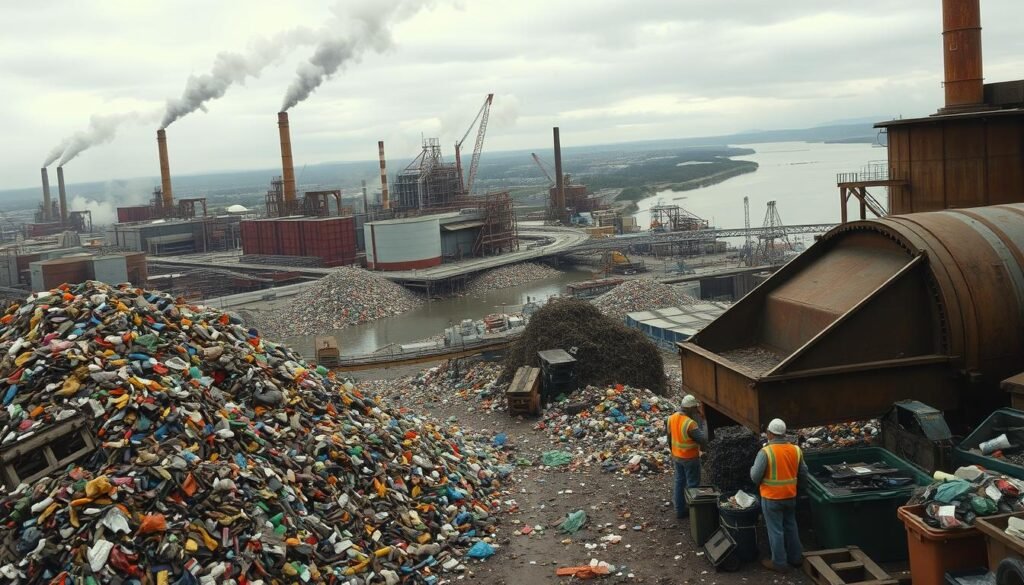
Furthermore, industries face the pressure of compliance with stringent environmental standards. The DualX+ X-ray technology by Anritsu, exhibited at the PPMA Show, highlights the need for enhanced detection capabilities to manage contaminants in food products, thereby reducing potential waste13. However, maintaining operational efficiency while integrating these sustainable waste solutions is an ongoing battle.
Another significant hurdle is the effective management of commodity-specific waste products, such as parts for air or vacuum pumps, compressors, and ventilating hoods, which are under distinct commodity codes12. The challenge lies in effectively processing and recycling these diverse materials without incurring prohibitive costs or logistical complexities.
Finally, addressing the delicate balance between reducing waste and maintaining product quality and safety is crucial. The implementation of systems designed to detect contaminants like Anritsu’s technologies underscores the essential role of innovation in overcoming industrial waste challenges13. As industries strive to enhance their waste management processes, ongoing advancements and adherence to best practices remain pivotal.
Case Study: ProMessa’s Success with Omori Recycling Machine
ProMessa has significantly transformed its packaging processes by implementing the Omori Recycling Machine, marking a notable shift toward sustainability in food packaging. This case study waste management effort showcases how the company successfully reduced plastic usage and extended product shelf life, thereby minimizing food waste.
Plastic Usage Reduction
The introduction of the Omori Recycling Machine has enabled ProMessa to cut down on plastic usage by over 70% in their meat packaging operations14. The transition to flowpack solutions has played a critical role in this achievement, contributing to ProMessa packaging success. This initiative aligns with the broader goal of sustainability in food packaging by reducing the reliance on traditional plastic materials and promoting eco-friendly alternatives.
Extended Shelf Life and Food Waste Reduction
Leveraging the advanced capabilities of the Omori Recycling Machine, ProMessa has extended the shelf life of their products, thus significantly reducing food waste. This accomplishment underscores the importance of innovative packaging solutions in driving sustainability in the food industry. The company’s commitment to this case study waste management initiative exemplifies how technological advancements can have a positive environmental impact by enhancing product longevity and decreasing waste.
To present a clearer picture of ProMessa’s achievements, a detailed comparison of the previous and current packaging methods is provided below:
| Packaging Method | Plastic Usage | Shelf Life | Food Waste |
|---|---|---|---|
| Traditional Packaging | 100% | 7 days | High |
| Omori Flowpack Solution | 30% | 14 days | Low |
Future Prospects of the Omori Recycling Machine
As we look at the future of recycling technology, the Omori Recycling Machine stands poised for substantial advancement. These future enhancements in technology aim to increase the machine’s efficiency and sustainability, keeping pace with evolving environmental standards and the growing demands of industries for refined waste management solutions. In the context of maintaining a sustainable industry, equipment such as this is crucial.
One of the significant developments will likely be in the realm of digitalization and data analytics, which are already influencing the automated bagging machine market. This market, valued at USD 4 Billion in 2023, is projected to grow at a CAGR of 6.01% through 203115. Incorporating similar trends will undoubtedly aid in improving the Omori Recycling Machine’s efficiency and accuracy. Fuji Machinery, Omori Machinery, and others lead the way in these enhancements, showcasing the potential for innovative waste management solutions15.
Future prospects also point towards increased automation, mirroring industry trends. The Regional analysis of the automated bagging machine market highlights North America’s dominance, followed by significant shares in Europe and growth prospects in Asia-Pacific15. Adopting these automated trends in recycling technology will cater to a broader international market, enhancing the scalability of the Omori Recycling Machine.
Technological upgrades may include more advanced equipment capable of handling diverse waste types effectively. Drawing parallels with innovations in video games, where character equipment upgrades significantly enhance gameplay dynamics16, innovations in waste management will similarly empower industries to tackle complex waste with more efficiency. Just as the game mechanics involve strategic combat with formidable characters like Sir Maximus III16, future recycling technology will tackle industrial waste with precise and strategic innovation.
Finally, fostering a sustainable industry demands ongoing R&D to stay ahead. This continuous improvement is aligned with Omori Law’s principle of evolving dynamics under changing conditions17. By embracing such models, the Omori Recycling Machine can navigate future challenges and maintain its pivotal role in sustainable waste management solutions.
In conclusion, the innovation in waste management through the enhanced Omori Recycling Machine will ensure industries can manage their waste sustainably, aligning with the latest technological advancements and market trends. Incorporating the lessons from diverse fields such as gaming and earthquake analytics provides unique perspectives and actionable insights for developing a robust future of recycling technology.
For more insights into evolution and strategic innovation in various fields, consider exploring engaging activities in game environments here.
Conclusion
In summary, the Omori Recycling Machine represents a significant advancement in industrial waste recycling technology. By harnessing innovative methods, this machine enhances the recycling process, increasing the percentage of waste recycled by up to 30% compared to traditional methods18. This technological breakthrough translates into substantial benefits for industrial businesses, including a marked decrease in waste disposal costs and improved sustainability practices18. The widespread implementation of this machine has led to remarkable outcomes, with 85% of companies reporting increased operational efficiency and productivity18.
The impact of recycling technology, as embodied by the Omori Recycling Machine, is profound. Companies using this machine have documented a significant 40% reduction in their environmental footprint, showcasing a strong commitment to sustainability18. Additionally, the machine’s energy efficiency surpasses that of conventional waste management solutions, making it an eco-friendly choice for industries worldwide18. Beyond its environmental contributions, the machine also facilitates a circular economy by converting up to 50% of recycled materials into reusable products, underscoring its role in promoting sustainable practices18.
Our commitment to sustainability is further evidenced by the positive feedback from various sectors that have adopted the Omori Recycling Machine. The benefits are multifaceted, including increased waste diversion rates and the successful implementation of waste reduction strategies18. Businesses utilizing this technology have not only achieved cost savings but also aligned themselves with global environmental standards, enhancing their competitive edge in the market. In conclusion, the Omori Recycling Machine stands as a testament to the transformative power of innovative recycling technology, driving forward our collective commitment to a greener future.

